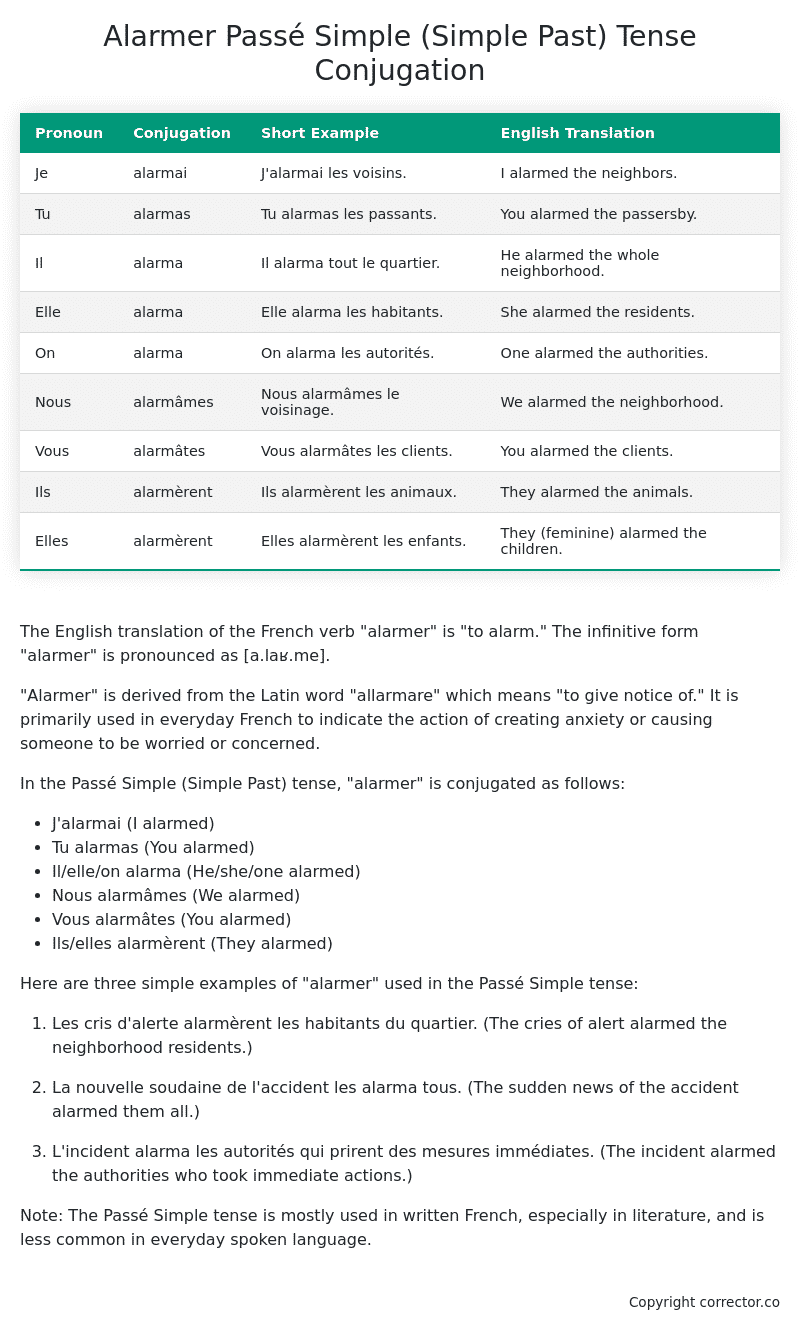Passé Simple (Simple Past) Tense Conjugation of the French Verb alarmer
Introduction to the verb alarmer
The English translation of the French verb “alarmer” is “to alarm.” The infinitive form “alarmer” is pronounced as [a.laʁ.me].
“Alarmer” is derived from the Latin word “allarmare” which means “to give notice of.” It is primarily used in everyday French to indicate the action of creating anxiety or causing someone to be worried or concerned.
In the Passé Simple (Simple Past) tense, “alarmer” is conjugated as follows:
- J’alarmai (I alarmed)
- Tu alarmas (You alarmed)
- Il/elle/on alarma (He/she/one alarmed)
- Nous alarmâmes (We alarmed)
- Vous alarmâtes (You alarmed)
- Ils/elles alarmèrent (They alarmed)
Here are three simple examples of “alarmer” used in the Passé Simple tense:
-
Les cris d’alerte alarmèrent les habitants du quartier.
(The cries of alert alarmed the neighborhood residents.) -
La nouvelle soudaine de l’accident les alarma tous.
(The sudden news of the accident alarmed them all.) -
L’incident alarma les autorités qui prirent des mesures immédiates.
(The incident alarmed the authorities who took immediate actions.)
Note: The Passé Simple tense is mostly used in written French, especially in literature, and is less common in everyday spoken language.
Table of the Passé Simple (Simple Past) Tense Conjugation of alarmer
| Pronoun | Conjugation | Short Example | English Translation |
|---|---|---|---|
| Je | alarmai | J’alarmai les voisins. | I alarmed the neighbors. |
| Tu | alarmas | Tu alarmas les passants. | You alarmed the passersby. |
| Il | alarma | Il alarma tout le quartier. | He alarmed the whole neighborhood. |
| Elle | alarma | Elle alarma les habitants. | She alarmed the residents. |
| On | alarma | On alarma les autorités. | One alarmed the authorities. |
| Nous | alarmâmes | Nous alarmâmes le voisinage. | We alarmed the neighborhood. |
| Vous | alarmâtes | Vous alarmâtes les clients. | You alarmed the clients. |
| Ils | alarmèrent | Ils alarmèrent les animaux. | They alarmed the animals. |
| Elles | alarmèrent | Elles alarmèrent les enfants. | They (feminine) alarmed the children. |
Other Conjugations for Alarmer.
Le Present (Present Tense) Conjugation of the French Verb alarmer
Imparfait (Imperfect) Tense Conjugation of the French Verb alarmer
Passé Simple (Simple Past) Tense Conjugation of the French Verb alarmer (You’re reading it right now!)
Passé Composé (Present Perfect) Tense Conjugation of the French Verb alarmer
Futur Simple (Simple Future) Tense Conjugation of the French Verb alarmer
Futur Proche (Near Future) Tense Conjugation of the French Verb alarmer
Plus-que-parfait (Pluperfect) Tense Conjugation of the French Verb alarmer
Passé Antérieur (Past Anterior) Tense Conjugation of the French Verb alarmer
Futur Antérieur (Future Anterior) Tense Conjugation of the French Verb alarmer
Subjonctif Présent (Subjunctive Present) Tense Conjugation of the French Verb alarmer
Subjonctif Passé (Subjunctive Past) Tense Conjugation of the French Verb alarmer
Subjonctif Imparfait (Subjunctive Imperfect) Tense Conjugation of the French Verb alarmer
Subjonctif Plus-que-parfait (Subjunctive Pluperfect) Tense Conjugation of the French Verb alarmer
Conditionnel Présent (Conditional Present) Tense Conjugation of the French Verb alarmer
Conditionnel Passé (Conditional Past) Tense Conjugation of the French Verb alarmer
Conditionnel Passé II (Conditional Past II) Tense Conjugation of the French Verb alarmer
L’impératif Présent (Imperative Present) Tense Conjugation of the French Verb alarmer
L’impératif Passé (Imperative Past) Tense Conjugation of the French Verb alarmer
L’infinitif Présent (Infinitive Present) Tense Conjugation of the French Verb alarmer
L’infinitif Passé (Infinitive Past) Tense Conjugation of the French Verb alarmer
Le Participe Présent (Present Participle) Tense Conjugation of the French Verb alarmer
Le Participe Passé (Past Participle) Tense Conjugation of the French Verb alarmer
Struggling with French verbs or the language in general? Why not use our free French Grammar Checker – no registration required!
Get a FREE Download Study Sheet of this Conjugation 🔥
Simply right click the image below, click “save image” and get your free reference for the alarmer Passé Simple tense conjugation!

Alarmer – About the French Passé Simple (Simple Past) Tense
Formation
Usage
Narration
Historical Context
Interactions with other tenses
Passé Composé
Imparfait
Conditional and Subjunctive
Summary
I hope you enjoyed this article on the verb alarmer. Still in a learning mood? Check out another TOTALLY random French verb conjugation!


